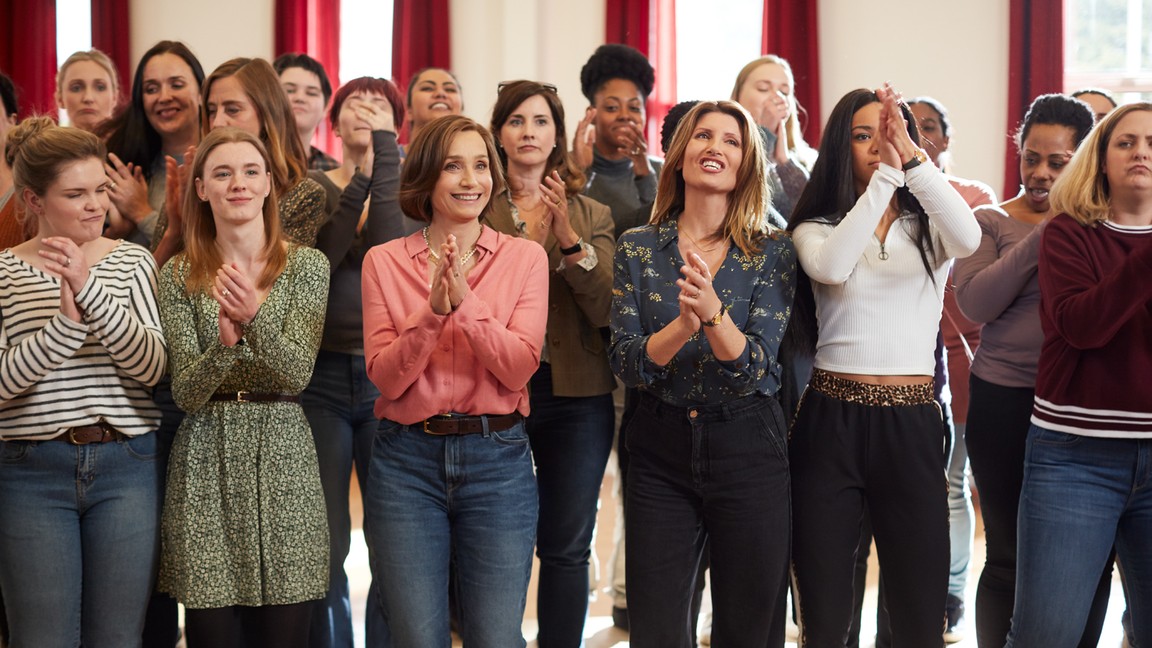Military Wives
Posted on May 21, 2020 at 5:26 pm
B +| Lowest Recommended Age: | Middle School |
| MPAA Rating: | Not rated, some mature material |
| Profanity: | Strong language |
| Alcohol/ Drugs: | Drinking and drunkenness, teen drinking |
| Violence/ Scariness: | Offscreen wartime violence and peril, characters injured and killed |
| Diversity Issues: | Diverse characters and issues of diversity |
| Date Released to Theaters: | May 22, 2020 |

“They also serve who only stand and wait.” Those lines by Milton are a powerful reminder of the quiet struggles of the families left behind when soldiers go to war. “Military Wives” is based on the real-life story of British women who stood and waited while their spouses were fighting in Afghanistan, and came together to form a choir that inspired audiences and led to the creation of choirs on other military bases.
The choir is as much the result of opposing forces as common interests. Kate (a frosty Kristen Scott Thomas) is the wife of one of the base’s commanding officers. He is about to return to duty for the first time since the death of their only son in action. We get a sense of their different ways of grieving — and the way his death has driven them apart — as they talk about a photograph of their son. Should it be left casually on the refrigerator as it was when he was alive or upgraded to a frame and protected by glass?
Lisa (“Catastrophe’s” Sharon Horgan) seems to have been designed to annoy and be annoyed by Kate. She is earthy, unpretentious, and outspoken and just generally messy. She is, in theory, in charge of organizing the morale-boosting base activities for the spouses. But she is not by nature or inclination an organized person. She has a rebellious teenage daughter she can barely manage. And she considers Kate’s “helpful” suggestions snobbish and unrealistic. How much comfort can worried, lonely wives of soldiers get from a knitting club or a film series to explore the auteur theory?
But Lisa cannot dispute Kate’s point that the women “need something to focus on, something to keep them together.” The idea of singing seems to have some appeal. Lisa tentatively agrees but want to keep it casual. “It’s like a drop-in,” she tells the women. “And then you commit,” says Kate. “A lot of fun,” says Lisa. “And uplifting,” says Kate.
They have different ideas about what to sing and how to rehearse. But just as different notes can make beautiful harmonies, the two women find a way to combine forces and even develop some respect for one another. With some bumps along the way. Kate says “it has to be challenging to give them something else to think about.” But it turns out that the challenge is what helps them think about all of it — worry, grief, fear — better.
“It’s like ‘Sister Act’ without the Mafia hit men!” one character says cheerfully. No Mafia hit men, no nuns, but real war, with real casualties, and real pain. The real turning point is when the women bring the people they miss into their performance. And the real highlight is the glimpses we get of the real choir and the others it inspired over the closing credits.
Families should know that this film includes some strong language, teen misbehavior, and sad offscreen war-related injuries and deaths.
Family discussion: Did your sympathies toward the characters shift over the course of the movie? Why? How did characters find different ways to deal with stress?
If you like this, try: “Young at Heart,” a documentary about a choir of elderly singers

